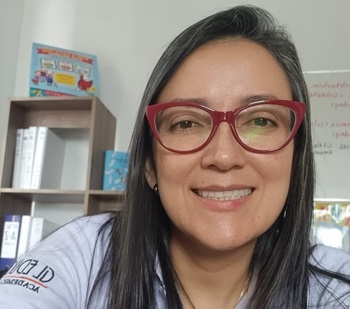
The
October/November/December 2025 issue of
Literacy Today, ILA’s member magazine, explores the importance of literacy coaching and how it ties in with curriculum and community.
Our guest editor for this edition, Sara Gonzalez Flechas, is a founding member of GL Books and the Literacy Center. A passionate literacy coach and advocate for bilingual students, Sarah currently serves as the national academic director leading curriculum design, teacher training, and literacy implementation across public and private institutions.
“Literacy work is never done in isolation. It thrives when we learn from one another, when we take risks, and when we keep students at the center of everything we do,” she wrote in her
opening note to readers.
Read on to learn more about the issue, how Sara approached its curation, and what she hopes readers take away from it.
Tell us how you developed your vision for this issue.
My vision for this issue was shaped by what is happening right now in Colombia. Over the past few years, we’ve been intentionally positioning literacy—not traditional EFL approaches—as a powerful and evidence-based alternative for teaching English. It has been a slow but meaningful process, and every step reinforces that the strongest results emerge when we move away from methods that, after many years, have not produced the outcomes our students deserve.
For this reason, I wanted this issue to spotlight the Colombian context and the people driving these changes. I invited Claudia González and Alberto Lozano because they have been central to rethinking English teaching in Colombia and are actively advancing research-based practices. In addition, Lauren Hegarty, Diego Garzón, Mariana Ocampo Hernández, and Carolina Caipa’s work shows what is possible when schools embrace literacy and coaching as long-term commitments—small-scale transformations that can grow into national impact. Their articles reflect a continuum: From early childhood to primary and secondary school, and even, as I mentioned
in my article, system-wide implementation in public education. Together, they portray a country in motion.
How did you approach selecting contributors? What important thread ties them together?
I chose contributors whose work reflects the real challenges—and real possibilities—of doing things differently in Colombia. While each author comes from a distinct context and perspective, they share a common thread: They are practitioners who are courageously reshaping English teaching through literacy and coaching.
Their collective contributions offer a full panorama of the impact literacy can have. Tatiana Charry’s
article brings us into kindergarten classrooms, while John Oyuela’s
piece extends to professional development and systems-level change. Each one helps build a wide-angle view of the essential work happening across levels, regions, and school types. Together, they show a unified story: Literacy matters, and it is transforming learning in Colombia.
Your opening letter mentions how essential it is that literacy work is "never done in isolation." Can you expand upon that thinking?
In Colombia, talking about literacy immediately implies collaboration, because no part of the system can shift on its own. Real change requires participation from teachers, principals, coordinators, and families—and even students themselves.
Tatiana highlights this beautifully
in her article, showing how young learners thrive when teachers and families work together. Mariana and Carolina
describe how implementing a reading program was only possible because coordinators, teachers, and the principal approached the process as a shared challenge and a shared responsibility. Across schools and communities, we see that literacy grows when everyone involved understands that there is an alternative way to approach English.
This is why I intentionally included voices from all sectors and all grade levels—from pre-kindergarten to professional educators. Literacy truly is collective work.
What are some of the biggest misconceptions about literacy coaching in your experience, and how does this issue address them?
One of the biggest misconceptions is that a coach is simply an observer whose role is to evaluate or judge. In Colombia, the term “literacy coach” is not commonly used in schools, and the role is often misunderstood or, in many cases, nonexistent. In my recent work in schools in El Salvador, I found the same challenge—so much so that I recommended creating the position as part of the school structure. A coach is not there to critique from the sidelines; a coach is an active partner in the learning process.
Another misconception is that coaching is limited to supporting teachers. Literacy coaching must be present in the classroom, working directly with instruction, with students, and with the school’s curricular decisions. It is hands-on, collaborative, and centered on improving practice in real time.
This issue illustrates these ideas by showing coaches and teachers working side-by-side, reflecting together, and transforming everyday classroom interactions
What do you hope readers will take away from this issue of Literacy Today, and how do you envision it sparking further conversation about literacy coaching?
I hope readers walk away with at least two things: A renewed willingness to question traditional approaches to language teaching, especially in multilingual or bilingual contexts, and a collection of practical, realistic ideas they can bring into their schools, classrooms, or teacher training programs.
I also hope this issue encourages educators to talk more openly about literacy coaching—not as an extra role or a luxury, but as a central component of instructional transformation. My wish is that readers begin asking:
- What would change if we saw literacy coaching as essential, not optional?
- How can coaching help us break long-standing patterns and move toward evidence-based teaching?
- What might English education look like if literacy were the foundation rather than an add-on?
If this issue sparks these conversations—and inspires teams to explore literacy as a path to more equitable, effective English learning—then it will have done exactly what I hoped.
Learn More
Defining and Refining Equitable Vocabulary Instruction for English Language Learners
Literacy Today magazine:
Coaching Across Borders